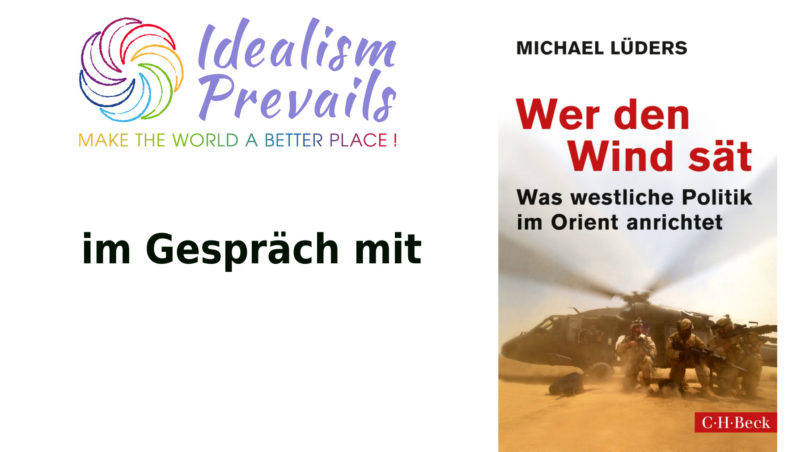Michael Lüders: He who sows the Wind …

All too often, we forget that we are the ones who re-create the world in which we live, day in, day out. And that our actions have consequences, regardless of whether or not we are aware of them. We quickly forget the contexts within which a certain situation is embedded and have the superficial impression that something happened almost without cause.
We then try to somehow understand the apparently inexplicable occurrence. We are naturally not in a position to take account of the innumerable, for us unknown factors in the case of different analyses of the facts but the truly worrying element is that we do not want to follow the causal effect of our actions.
Many people ask themselves these questions when they are confronted with the shocking current events and upheavals in the Middle East and in Europe (but also in the whole world).
Luckily, there are valuable books such as Michael Lüders „Wer den Wind sät. Was westliche Politik im Orient anrichtet“, which fully deserves its acclaim as one of the most outstanding historical-political analsyses of recent years.
I had a talk with Michael Lüders about this:
Mr Lüders, what is written on the back cover of your book is not merely advertising. You kept your promise and, after reading the book, you truly have the impression of having relevant knowledge which enables you to better understand the many events in the Orient. Or to put it another way: you help the uninitiated read and convey a context without which they cannot build a comprehensive picture of the current momentous political events. I would like to thank you personally and also on behalf of all your readers!
Many thanks for your praise!
In your opinion, how well acquainted is the average European citizen with current political events?
The majority of western Europeans are currently worried about the social pressure which they are exposed to. The middle class threatens to slide into the lower third. The middle middle class hopes to maintain its living standard. The refugee crisis is now becoming the focus of fears and worries: the foreigners and the Muslims are to blame for everything! Western media for the most part follow the mainstream which only provides poor information of current events.
Are there any concrete features the presence of which the news watcher would be able to clearly ascertain that the message is fake or can it simply be assumed that almost all that is served to us is merely an adapted half-truth?
We have to start to think more and to research, to exchange ideas. Otherwise we have to be content with adapted half-truths.
Your book has sold very well. This clearly indicates a great interest in the topic. But also that there is a need for a holistic understanding of subjects which are important to all of us. How was your book received and treated in the mainstream media? Were you marginalised, censored? And if so, how did you deal with this?
„Wer den Wind sät“ was totally ignored by national quality newspapers – there was not one review. But there was much positive resonance in radio and television.
Donald Trump has become the new President of America. Can we already make predictions about the further political strategies of the USA in the Middle East?
It is too early to make any statement about the future policy of Donald Trump, regardless of in which field. Will he try to establish a new relationship to Russia? In this case he would have to take on powerful elements in the American Establishment who are not interested in a normalisation of relationships with Russia – due to power-political and economic reasons. Moreover, every armaments industry needs an enemy.
Nowadays it requires much courage to talk about the violence and injustices in the politics of Israel vis-à-vis Palestine. It is irrelevant how well-founded and proven the facts in your line of reasoning are, one is immediately labelled a Nazi. Are you one of these courageous people? Do you have the impression that you often have to defend yourself because of this?
As a result of the fact that the Beck publishing house is a renowned publisher which has published much Judaica, I have not been subject to direct attacks. Despite this, I avoid holding public lectures on this topic because the risk of being consciously misunderstood is very great – even with the utmost objectivity.
The fear of Islam is a dominant topic in Europe. This is stirred up by the media, from groups and from individuals who hope to gain an advantage from such an atmosphere. What advantages could be gained and what can we do to effect a diffusion?
“Islam” is a controversial topic throughout Europe for many reasons. How can we diffuse this atmosphere? This is difficult to say and it will be different from country to country.
Apparently societies always need groups upon which they can vent their anger and aggression. This will not change much as long as social opposites intensify.
In your opinion, is there a masterplan behind all these armed conflicts which the power elite are following in order to achieve a certain, for us unknown, objective? What has to happen in concrete terms so that the responsible powers that be can say: “Now it’s enough, war is no longer necessary, we do not have to use violence, the objective has been achieved”?
There is definitely no “masterplan” of any power elite – but the super powers are determined to defend their interests by all means possible, also militarily. This is dangerous, as the examples of the Ukraine and Syria highlight. Despite all the justified criticism of Russian policy, western policy is not any less self-serving but likes to “sell” itself under the heading: “We are defending our values”. There is much hypocrisy at play here.
In another time, you studied Arabian literature in Damascus. Could you recommend any literature which could serve as a bridge between the cultures?
One book is a must: the historical novel, “Samarkand” by Amin Maalouf, a French-Lebanese writer, which was published in 2015. His narrative connects the Orient and Occident and spans a wide range of historical subjects from the great Persian universal scholar, Omar Khayyam, who lived 1,000 years ago to the present.
How do you see the role of civil movements which, like Idealism Prevails, advocate more self-responsibility, humanity, liberal thinking and civil liberties? Civil movements which offer an educational platform and who regard it as their task to report freely on important issues from all topics of life but, above all, also to connect people on a deeply humanistic level with each other and to promote an exchange of ideas.
Credits
| Image | Title | Author | License |
|---|---|---|---|
 |
He who sows the Wind… | Patryk Kopaczynski | CC BY-SA 4.0 |
